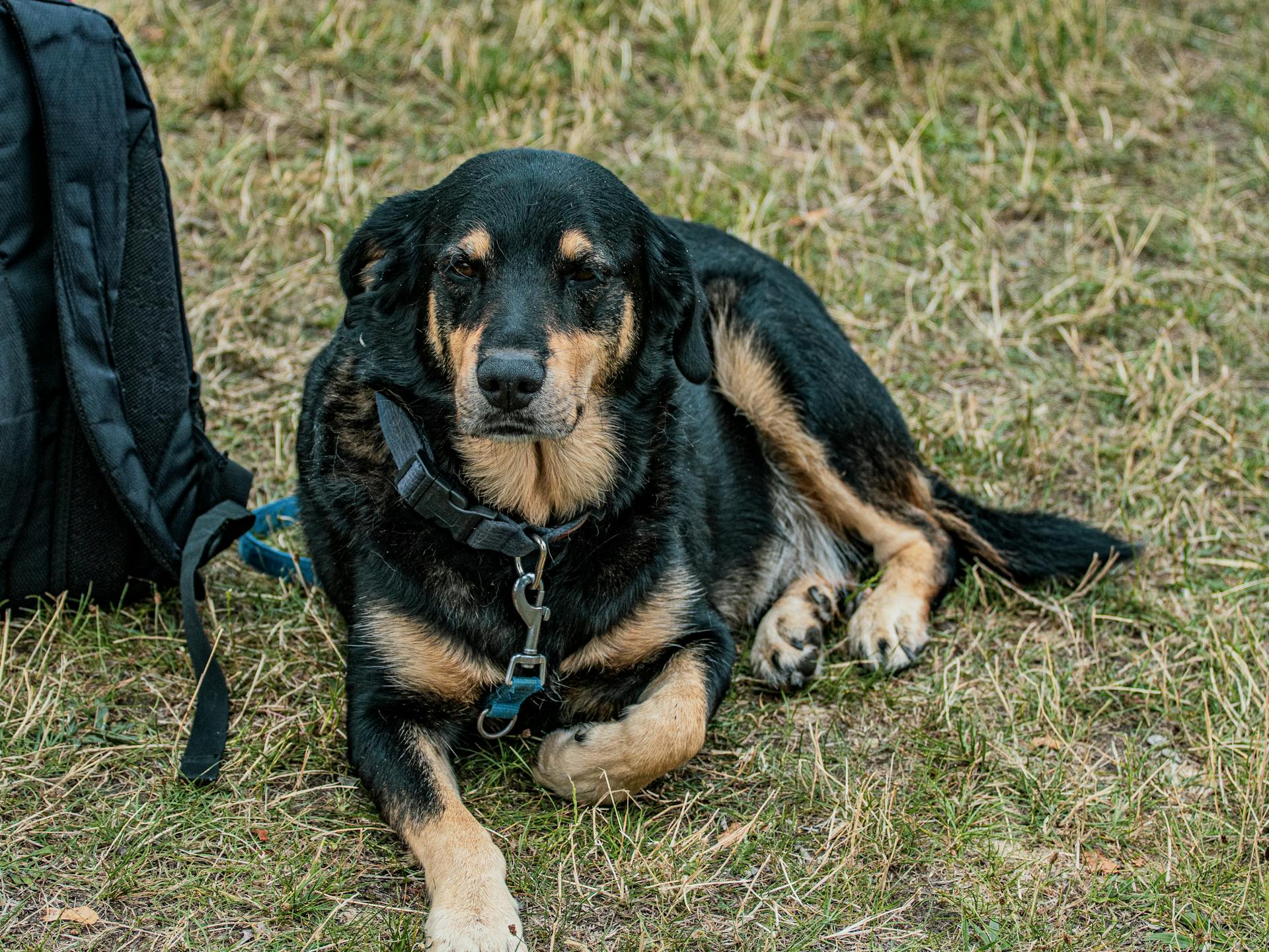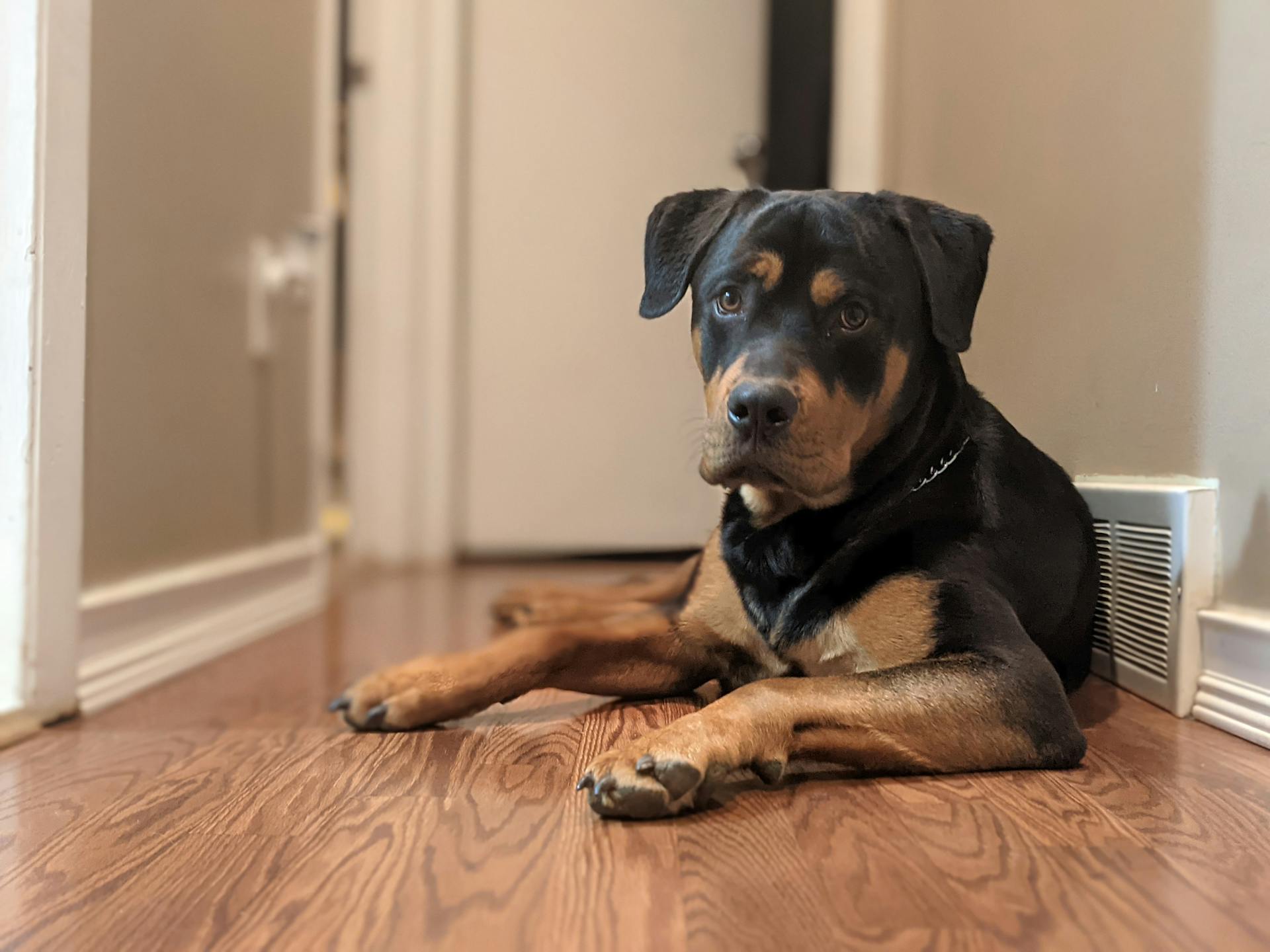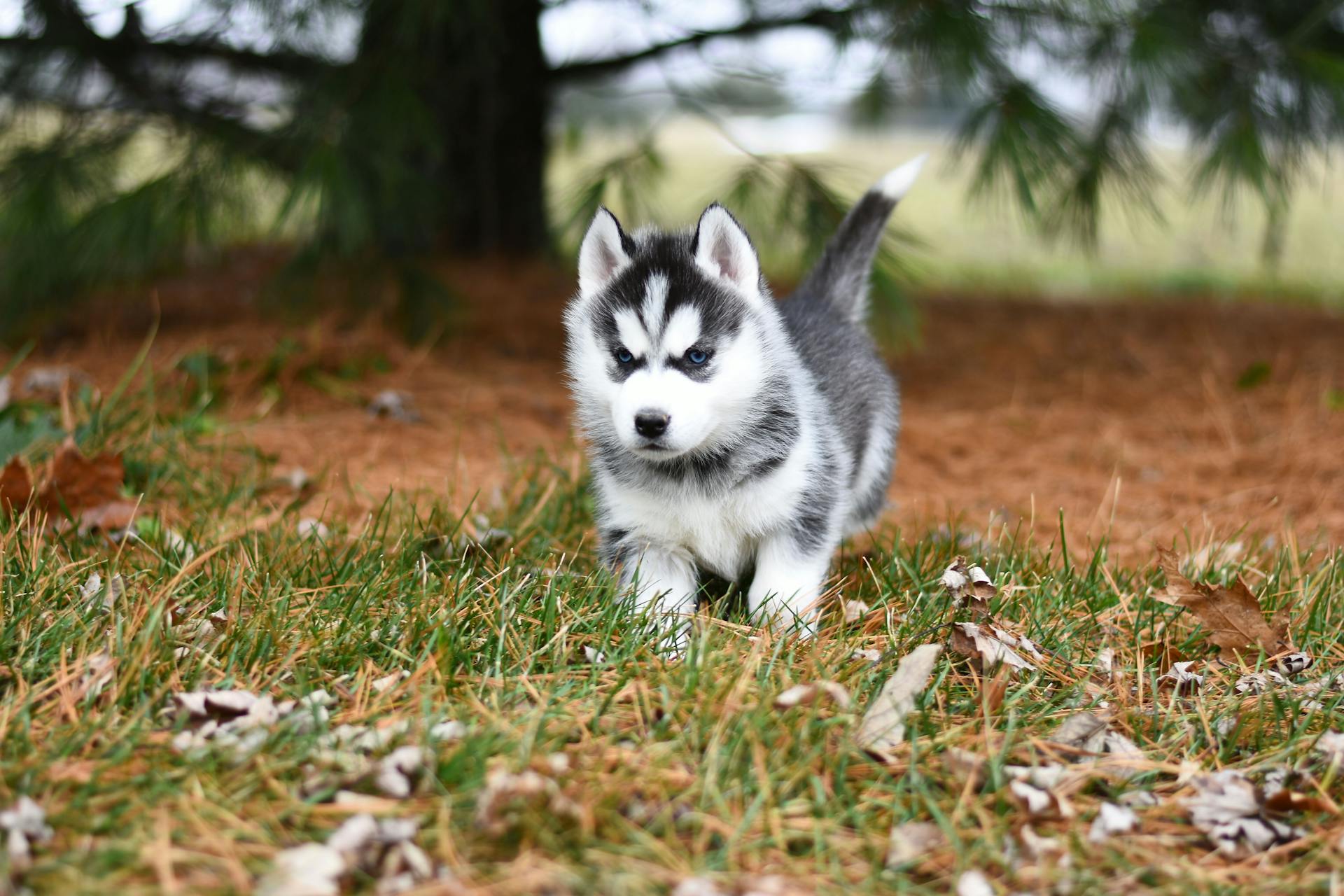
Male Rottweilers typically live between 8-11 years on average, with some living up to 13 years with proper care.
Their lifespan is influenced by factors such as diet, exercise, and health conditions.
Genetic predispositions can also play a role in determining their lifespan.
Proper care, including regular veterinary check-ups, can help extend their lifespan.
Take a look at this: Preventative Care Keeping Your Pet Healthy Year-Round
Factors Affecting Lifespan
Male Rottweilers, on average, live between 9-10 years, which is on the lower end of the typical dog lifespan range of 8-15 years. This is partly due to their large size.
Genetics play a significant role in determining a Rottweiler's lifespan. Responsible breeders can minimize the risk of health problems by conducting health testing and selective breeding.
Spaying or neutering a Rottweiler before the age of one may risk the dog developing osteosarcoma, a bone cancer common in the breed.
A Rottweiler's size is another factor that affects their lifespan. Researchers believe that for every 4.4 pounds of body weight, the dog's lifespan is reduced by about a month.
Rottweilers raised in a caring and loving environment are more likely to be happier and live longer. Having an affectionate family can help develop a sound mind and friendly temperament.
A healthy diet and regular exercise are crucial for maintaining a Rottweiler's physical and mental well-being. Slimmer dogs live two years longer than overweight ones.
Here are the top factors affecting a Rottweiler's lifespan:
- Genetics
- Spaying/Neutering
- Size
- Environment
- Health
Health and Illnesses
Male Rottweilers are prone to various health issues that can affect their lifespan. Routine veterinary exams and pet insurance can help mitigate these problems.
Hip dysplasia and osteochondritis are common joint disorders that can lead to decreased mobility and pain. Osteosarcoma, a fast-spreading bone cancer, is also a significant concern for Rottweilers.
Male Rottweilers are 5 times more likely to develop osteosarcomas than other breeds. This type of bone tumor develops in 5-12% of Rottweilers at some point in their lives.
Here are some of the most common health issues affecting male Rottweilers:
- Panosteitis
- Hip dysplasia
- Allergies
- Canine bloat/torsion
- Cataracts
- Hypothyroidism
Health Issues
Rottweilers are prone to many health problems, and as a responsible owner, it's essential to be aware of the common issues that can affect your furry friend. Routine veterinary exams are crucial for keeping your Rottweiler healthy, and pet insurance may be a good investment when bringing home a Rottweiler puppy.
Hip dysplasia is a genetic abnormality that causes the hip joint to be malformed, leading to decreased mobility and pain. Osteochondritis is another joint disorder that affects large breeds, causing cartilage inflammation and separation from the bone.
Osteosarcoma is a fast-spreading cancer that affects the musculoskeletal system, leading to immobility and premature death. Rottweilers are 5 times more likely to develop osteosarcomas than any other average dog, with a 5-12% chance of developing this type of bone tumor.
Some other health issues that affect Rottweilers include Panosteitis, allergies, canine bloat/torsion, cataracts, and hypothyroidism. While hip dysplasia and Panosteitis don't directly affect lifespan, they can negatively impact a dog's quality of life.
Explore further: Hip Dysplasia in Rottweilers

Here are some of the common health issues that affect Rottweilers:
- Hip dysplasia
- Osteochondritis
- Osteosarcoma
- Panosteitis
- Allergies
- Canine bloat/torsion
- Cataracts
- Hypothyroidism
It's essential to work with a responsible breeder who runs health screenings to ensure they're producing healthy puppies. With early diagnosis and treatment, many of these health issues can be managed, and your Rottweiler can live a happy and healthy life.
Additional reading: Healthy Pet Wellness Center
Male and Female Coexist
When you have a Rottweiler as a pet, it's essential to consider their lifespan. The average life expectancy of Rottweilers is 8 to 12 years.
Females tend to outlive males, with an average lifespan that's 2 years longer than males.
For more insights, see: Lhasa Apso Average Weight
Lifespan and Comparison
Rottweilers have a shorter lifespan compared to other breeds of the same size and weight class. They are known for their strong personalities, good temperaments, and high loyalty.
Their lifespan depends on various factors, including genetics, spaying/neutering, size, environment, and health. Responsible breeders can minimize health problems through health testing and selective breeding.
Spaying or neutering a Rottweiler before the age of one may risk developing osteosarcoma, a bone cancer common in Rottweilers. It's best to wait until a Rottweiler reaches at least twelve months old or older before spaying or neutering.
Big dogs like Rottweilers age quickly, and their lifespan is reduced by about a month for every 4.4 pounds of body weight. This means smaller Rottweilers may live longer than larger ones.
A Rottweiler's health is a significant factor in determining its lifespan, and the breed is predisposed to several health problems. These include osteosarcoma, which can be linked to spaying/neutering too early.
Here's a comparison of Rottweilers' lifespan to human years: their life expectancy is between 60 and 90 human years. However, every dog is an individual, and there's no one-size-fits-all figure for their lifespan.
For more insights, see: Kennel Cough Transmission
Size and Genetics
Size plays a significant role in determining a Rottweiler's lifespan, with small dogs generally living longer than large dogs.
Large dogs, like Rottweilers, have an increased risk of developing cancer, which can shorten their lifespan. This means that Rottweilers will not live as long as smaller breeds like Chihuahuas.
The median lifespan of a big dog like a Rottweiler is 13.38 years, which is slightly below the average for large breed dogs.
Here's an interesting read: Seresto Large Dog Flea Collar
Life Span of Crossbreeds
The life span of crossbreeds can vary depending on their size, with smaller breeds generally living longer than larger ones. On average, a crossbreed's life span is around 12-15 years.
Smaller crossbreeds, such as the Cockapoo, can live up to 15 years or more.
A fresh viewpoint: Lakeland Terrier Lifespan
Purebred Live?
Purebred Rottweilers have a relatively short lifespan, living approximately 8 to 12 years on average.
Large breeds, like Rottweilers, typically have shorter lifespans than smaller dogs. Smaller dogs can live up to 15 to 16 years.
A well-bred, average-size Rottie's lifespan can range from 8 to 12 years, but it may fall even shorter, living only 6 to 7 years.
Size

Size plays a significant role in determining a dog's lifespan. Small dogs tend to live longer than large dogs, with a median lifespan of 14.95 years compared to 13.38 years for big dogs.
A scientific study involving over 2 million dogs found that a dog's size is the single most important factor in predicting its lifespan. In this study, small dogs consistently outlived their larger counterparts.
The American Animal Hospital Association (AAHA) conducted a study that found small dogs have a median lifespan of 14.95 years. This is significantly longer than the median lifespan of big dogs, which is 13.38 years.
Large breed dogs, like Rottweilers, tend to have shorter lifespans than small dogs. For example, a Rottweiler's life expectancy is similar to that of other large breed dogs, but shorter than that of small dogs like Chihuahuas.
The life expectancy of a Rottweiler is similar to that of other large breed dogs, such as German shepherds, golden retrievers, and Doberman pinschers.
On a similar theme: Big Rottweilers
Extending Lifespan
Choosing a healthy and well-bred Rottweiler puppy from a reputable breeder is essential, as it can minimize the risk of inherited health problems.
Genetics play a significant role in determining a Rottweiler's lifespan. Responsible breeders ensure that their dogs are health-tested and selectively bred to reduce the risk of inherited health issues.
Spaying or neutering a Rottweiler too early may risk the dog developing osteosarcoma, a bone cancer highly common in the breed. It's best to wait until a Rottweiler reaches at least twelve months old or older before spaying or neutering.
A slimmer Rottweiler lives two years longer than an overweight one, so proper nutrition and daily exercise are crucial for maintaining a healthy weight. This can help keep your Rottweiler physically and mentally fit.
Here are some key factors that can affect a Rottweiler's lifespan:
- Genetics
- Spaying/Neutering
- Size (every 4.4 pounds of body weight reduces lifespan by about a month)
- Environment (caring and loving environment can contribute to a longer lifespan)
- Health (health problems can shorten lifespan)
Help and Comparison
Male Rottweilers can live up to 8-11 years with proper care and nutrition, but their lifespan can be affected by various factors.
Regular exercise and a healthy diet are crucial for a Rottweiler's overall health, and a study found that dogs that receive regular exercise have a 15% lower risk of obesity.
Rottweilers are prone to certain health issues, such as hip dysplasia and elbow dysplasia, which can significantly impact their lifespan.
A well-structured feeding schedule and a balanced diet can help prevent or manage these conditions.
Male Rottweilers that are neutered before the age of 1 year may have a lower risk of certain health issues, but this procedure should be carefully considered.
Some owners have reported that their Rottweilers have lived longer than average with proper care and attention to their health.
Discover more: Raw Food Diet for Rottweilers
Frequently Asked Questions
What is the most common cause of death in Rottweilers?
The most common cause of death in Rottweilers is cancer, specifically bone cancer, which often has a poor prognosis despite available treatment.
What age do Rottweilers slow down?
Rottweilers typically start slowing down around their 7th birthday. This is a normal part of aging and not a cause for concern.
Can Rottweiler live for 15 years?
While some dog breeds can live up to 15 years, the average lifespan of a Rottweiler is significantly shorter, typically ranging from 9 to 9.5 years.
How long do purebred German Rottweilers live?
Purebred German Rottweilers typically live for about 12 years. However, proper breeding and care are crucial to ensure a long and healthy life.
Sources
- https://www.petmd.com/dog/breeds/rottweiler
- https://nativepet.com/blogs/health/rottweiler-life-expectancy
- https://www.a-love-of-rottweilers.com/rottweiler-life-span.html
- https://www.slideshare.net/slideshow/what-is-the-lifespan-of-a-rottweiler-and-how-to-increase-it/255435442
- https://www.ukpets.com/blog/how-long-do-rottweilers-live/
Featured Images: pexels.com


